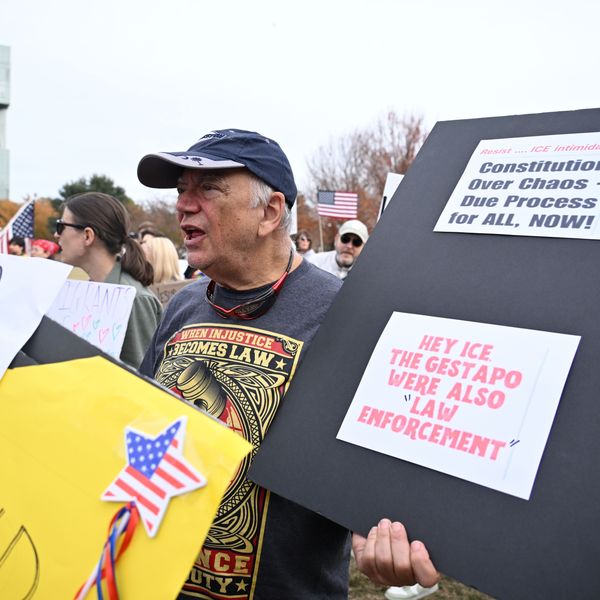Pre-empting Local Democracy in North Carolina and Beyond
Date on which the city council in Charlotte, North Carolina, passed an ordinance expanding the city's non-discrimination policy to offer new protections for lesbian, gay, bisexual and transgender people and to allow people to use public restrooms based on their gender identity: 2/22/2016
Vote by which the Charlotte ordinance passed: 7-4
Date on which it was set to take effect: 4/1/2016
Date on which North Carolina's Republican-controlled legislature convened a special session to overturn the Charlotte ordinance with House Bill 2, which was expanded to include provisions banning local governments from adopting minimum-wage and anti-discrimination ordinances: 3/23/2016
Amount it costs per day to convene a special session: $42,000
Number of hours that passed between the bill's introduction and its signing into law by Republican Gov. Pat McCrory: 9
Minutes members of the House committee that considered the bill got to read it: 5
Minutes the House allotted for public comment on the measure: 30
Final vote to pass the bill in the House: 82-26
Number of House Democrats who voted for the bill, which had the support of all of the Republicans: 11
The vote to pass the bill in the Senate after all of the Democrats walked out of the chamber in protest: 32-0
Number of advocacy groups that have announced they are considering litigation challenging the law: 3
Last year alone, number of state legislatures that considered bills to block local control over a range of issues, including LGBT rights, the minimum wage, fracking, gun control and immigration: 29
Number of such local pre-emption bills filed so far this year just in Florida: 20
Number of states in which the American Legislative Exchange Council (ALEC), a group that crafts model legislation promoting the interests of its corporate funder including telecom giants like AT&T and Comcast, has worked to pre-empt municipal broadband services: 19
Date on which McCrory signed into law an ALEC-inspired bill to ban North Carolina communities from adopting so-called "sanctuary city" or "community trust policies" limiting local police involvement in federal immigration enforcement: 10/29/2015
Year in which the Texas community of Denton passed a local ballot initiative against fracking only to have the oil and gas industry join forces with ALEC-affiliated state lawmakers to override it: 2014
Number of other states that have already passed laws pre-empting local non-discrimination ordinances: 2*
Month in which South Dakota passed such a bill only to have Republican Gov. Dennis Daugaard veto it, arguing it didn't address any pressing need: 2/2016
Number of states that so far this year are considering bills to reverse the corporate-backed trend towards pre-emption: 2
* Tennessee in 2011 and Arkansas in 2015.
(Click on figure to go to source.)
An Urgent Message From Our Co-Founder
Dear Common Dreams reader, The U.S. is on a fast track to authoritarianism like nothing I've ever seen. Meanwhile, corporate news outlets are utterly capitulating to Trump, twisting their coverage to avoid drawing his ire while lining up to stuff cash in his pockets. That's why I believe that Common Dreams is doing the best and most consequential reporting that we've ever done. Our small but mighty team is a progressive reporting powerhouse, covering the news every day that the corporate media never will. Our mission has always been simple: To inform. To inspire. And to ignite change for the common good. Now here's the key piece that I want all our readers to understand: None of this would be possible without your financial support. That's not just some fundraising cliche. It's the absolute and literal truth. We don't accept corporate advertising and never will. We don't have a paywall because we don't think people should be blocked from critical news based on their ability to pay. Everything we do is funded by the donations of readers like you. Will you donate now to help power the nonprofit, independent reporting of Common Dreams? Thank you for being a vital member of our community. Together, we can keep independent journalism alive when it’s needed most. - Craig Brown, Co-founder |
Date on which the city council in Charlotte, North Carolina, passed an ordinance expanding the city's non-discrimination policy to offer new protections for lesbian, gay, bisexual and transgender people and to allow people to use public restrooms based on their gender identity: 2/22/2016
Vote by which the Charlotte ordinance passed: 7-4
Date on which it was set to take effect: 4/1/2016
Date on which North Carolina's Republican-controlled legislature convened a special session to overturn the Charlotte ordinance with House Bill 2, which was expanded to include provisions banning local governments from adopting minimum-wage and anti-discrimination ordinances: 3/23/2016
Amount it costs per day to convene a special session: $42,000
Number of hours that passed between the bill's introduction and its signing into law by Republican Gov. Pat McCrory: 9
Minutes members of the House committee that considered the bill got to read it: 5
Minutes the House allotted for public comment on the measure: 30
Final vote to pass the bill in the House: 82-26
Number of House Democrats who voted for the bill, which had the support of all of the Republicans: 11
The vote to pass the bill in the Senate after all of the Democrats walked out of the chamber in protest: 32-0
Number of advocacy groups that have announced they are considering litigation challenging the law: 3
Last year alone, number of state legislatures that considered bills to block local control over a range of issues, including LGBT rights, the minimum wage, fracking, gun control and immigration: 29
Number of such local pre-emption bills filed so far this year just in Florida: 20
Number of states in which the American Legislative Exchange Council (ALEC), a group that crafts model legislation promoting the interests of its corporate funder including telecom giants like AT&T and Comcast, has worked to pre-empt municipal broadband services: 19
Date on which McCrory signed into law an ALEC-inspired bill to ban North Carolina communities from adopting so-called "sanctuary city" or "community trust policies" limiting local police involvement in federal immigration enforcement: 10/29/2015
Year in which the Texas community of Denton passed a local ballot initiative against fracking only to have the oil and gas industry join forces with ALEC-affiliated state lawmakers to override it: 2014
Number of other states that have already passed laws pre-empting local non-discrimination ordinances: 2*
Month in which South Dakota passed such a bill only to have Republican Gov. Dennis Daugaard veto it, arguing it didn't address any pressing need: 2/2016
Number of states that so far this year are considering bills to reverse the corporate-backed trend towards pre-emption: 2
* Tennessee in 2011 and Arkansas in 2015.
(Click on figure to go to source.)
Date on which the city council in Charlotte, North Carolina, passed an ordinance expanding the city's non-discrimination policy to offer new protections for lesbian, gay, bisexual and transgender people and to allow people to use public restrooms based on their gender identity: 2/22/2016
Vote by which the Charlotte ordinance passed: 7-4
Date on which it was set to take effect: 4/1/2016
Date on which North Carolina's Republican-controlled legislature convened a special session to overturn the Charlotte ordinance with House Bill 2, which was expanded to include provisions banning local governments from adopting minimum-wage and anti-discrimination ordinances: 3/23/2016
Amount it costs per day to convene a special session: $42,000
Number of hours that passed between the bill's introduction and its signing into law by Republican Gov. Pat McCrory: 9
Minutes members of the House committee that considered the bill got to read it: 5
Minutes the House allotted for public comment on the measure: 30
Final vote to pass the bill in the House: 82-26
Number of House Democrats who voted for the bill, which had the support of all of the Republicans: 11
The vote to pass the bill in the Senate after all of the Democrats walked out of the chamber in protest: 32-0
Number of advocacy groups that have announced they are considering litigation challenging the law: 3
Last year alone, number of state legislatures that considered bills to block local control over a range of issues, including LGBT rights, the minimum wage, fracking, gun control and immigration: 29
Number of such local pre-emption bills filed so far this year just in Florida: 20
Number of states in which the American Legislative Exchange Council (ALEC), a group that crafts model legislation promoting the interests of its corporate funder including telecom giants like AT&T and Comcast, has worked to pre-empt municipal broadband services: 19
Date on which McCrory signed into law an ALEC-inspired bill to ban North Carolina communities from adopting so-called "sanctuary city" or "community trust policies" limiting local police involvement in federal immigration enforcement: 10/29/2015
Year in which the Texas community of Denton passed a local ballot initiative against fracking only to have the oil and gas industry join forces with ALEC-affiliated state lawmakers to override it: 2014
Number of other states that have already passed laws pre-empting local non-discrimination ordinances: 2*
Month in which South Dakota passed such a bill only to have Republican Gov. Dennis Daugaard veto it, arguing it didn't address any pressing need: 2/2016
Number of states that so far this year are considering bills to reverse the corporate-backed trend towards pre-emption: 2
* Tennessee in 2011 and Arkansas in 2015.
(Click on figure to go to source.)

